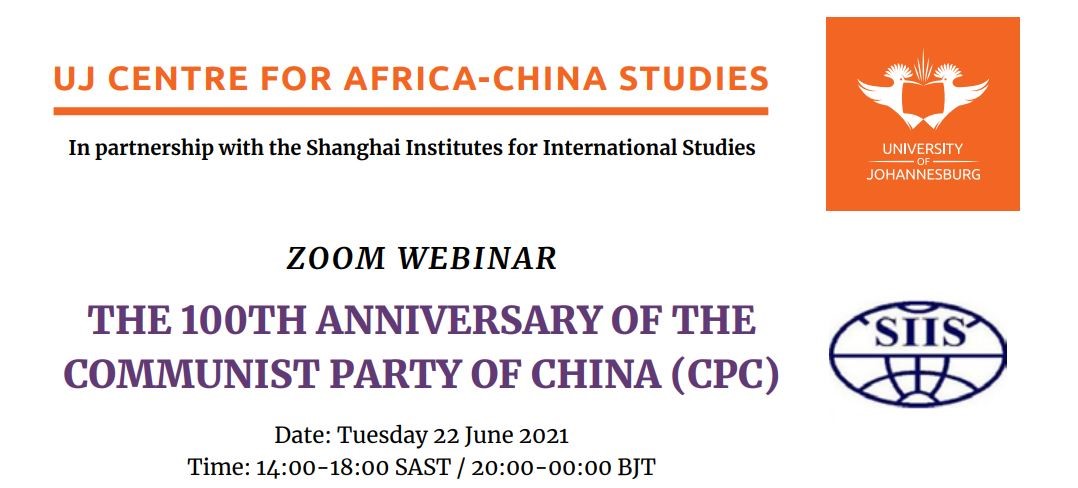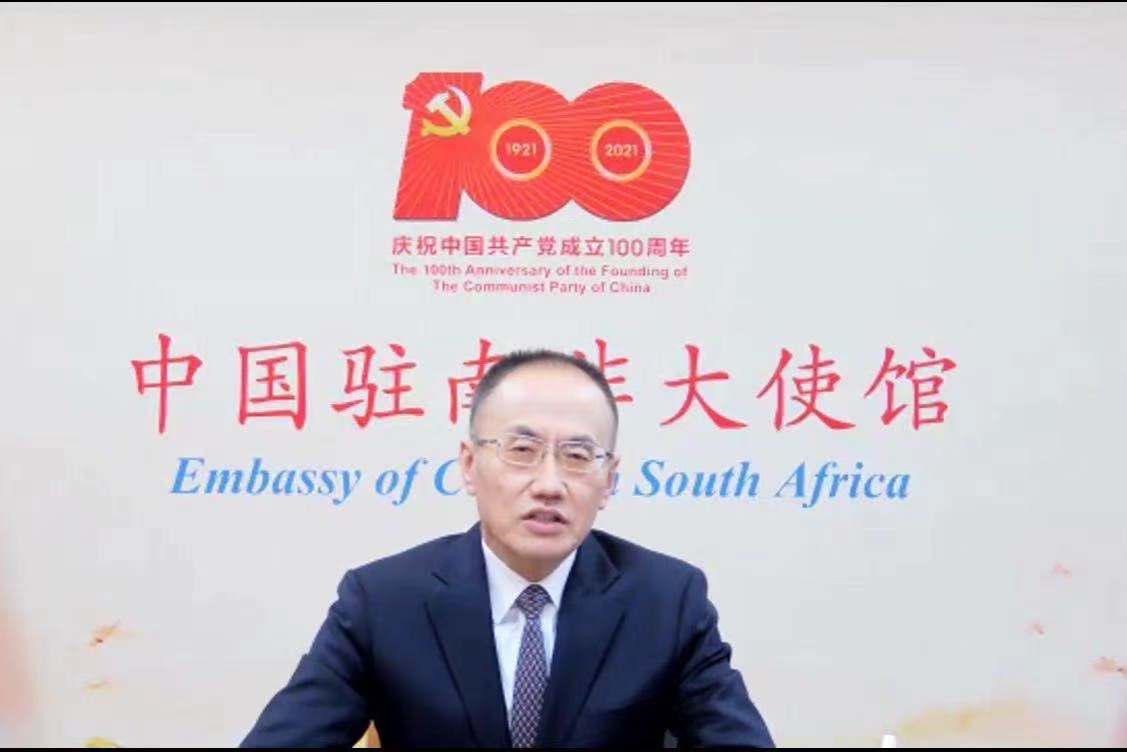On June 22nd, 2021, SIIS jointly held a webinar on "Celebrating the 100th Anniversary of the Communist Party of China" with the Center for Africa-China Studies of the University of Johannesburg (South Africa) and the China-Africa Institute. H.E. Amb. Chen Xiaodong, Chinese ambassador to South Africa, Mr. Solly Mapaila, First Deputy General Secretary of South African Communist Party, Prof. Tshilidzi Marwala, UJ Vice-Chancellor and Principal, and Prof. Chen Dongxiao, President of SIIS, delivered keynote speeches respectively.


H.E. Amb. Chen Xiaodong, Chinese ambassador to South Africa

Mr. Solly Mapaila, First Deputy General Secretary of South African Communist Party

Prof. Tshilidzi Marwala, UJ Vice-Chancellor and Principal
Experts of China-African studies from China, South Africa, Zimbabwe, Russia and other countries attended the webinar. Participants warmly congratulated the CPC on its centenary, spoke highly of the great achievements made by the CPC since its founding, and discussed CPC’s contribution to the world from different perspectives, and the significance of inter-party exchanges between the Communist Party of China and Africa.

Prof. Chen Dongxiao, President of SIIS
The following is the full text of SIIS President Chen Dongxiao's speech:
Distinguished guests from Africa, China and other parts of the world,
Dear Colleagues,
Ladies and Gentlemen,
We are very pleased that the SIIS, together with University of Johannesburg and China Academy of Social Science co-host this seminar to memorize the 100th Anniversary of the CPC.
The SIIS was established in 1960 under the initiative of late Chinese Premier ZHOU Enlai. We all know that Premier ZHOU and Chairman MAO laid down the foundations of the special partnership and friendship between China and Africa. As a Chinese think tank initiated by Premier Zhou, we have long cherished a special bound with Africa.
Talking about Chairman MAO and Premier ZHOU, we would surely mention one of their old friends in Africa —— Kenneth “KK” Kaunda, the Founding President of Zambia. Knowing that Zambia, South Africa and many other parts of Africa are deeply grieved by the passing of President Kaunda, on behalf of the SIIS and myself, please let me extend my condolences to the Kaunda Family and the government and people of the Republic of Zambia plus South Africa. The passing of President Kaunda is a huge loss for Africa and for the bilateral relations between Africa and China.
Dear colleagues and friends,
Today’s thematic topic is on Communist Party of China. The City of Shanghai, where our Institutes are based, has long been labeled as “delivery room” of the CPC. The first Chinese version of Communist Manifesto was published in Shanghai in 1920. Since then it has enlightened many Chinese people to join the endeavor led by CPC.
The initial groups of the CPC were established in Shanghai in 1920 and the CPC’s first National Plenary 1921 was held in Shanghai, and until early 1930s Shanghai hosted the CPC National headquarter for around 10 years.
Before 1921, Zhou Enlai, Deng Xiaoping and Marshall CHEN Yi and many CPC’s leaders and founding member of PRC left for Europe as part-time students for further study via Shanghai port. The time of their study in Europe gave them wide access to Marxism and made them become the believers in Marxism. In other words, Shanghai is starting point of their revolutionary career. To that extent, Shanghai is both the birth place of CPC and PRC.
Dear Colleagues and friends,
The world today is still suffering from lockdown blocking normal people-to-people exchanges. But it should not be the reason of short-sighted and narrow-minded thinking. I once read the story about Mr. Mandela, when he was put in prison for decades, he kept reading, studying and thinking for a beautiful version of a post-Apartheid South Africa.
In 2015, when Chinese President XI Jinping made his state visit to South African, he got a special gift from his counterpart. It is one black leather sofa. Then South African President explained that South Africans believe that only true friends could sit together on same sofa and have sincere chats.
I hope that the seminar could be the “sofa” to begin our sincere and fruitful exchange.
History is not just old stories, It has served as the solid basis of mutual special partnership through our concerted efforts by good friends, good partners, and good brothers both in terms of China’s relationship with Africa in general and with South Africa particular.
I would like to offer my personal suggestions for this seminar here:
Firstly, we should make full good use of this seminar as a good start to further promote bilateral mutual understanding. This seminar, along with many other bilateral forums should work as mechanism for our long-term partnership in holistically. This kind of seminar should not be conducted as one- shot event. Rather, we should institutionalize it, which means this seminar should be cultivated as an important part of network of academic and cultural exchange between China and South Africa, particularly on the topic of political party, its multiple functions and its unique role in the trajectory of bilateral relations.
Secondly, we should translate this seminar outcomes into more deliverable knowledge products. As I said previously, the fast growing China-Africa relations are always in huge need of valuable inputs from think tanks. Today, there have been growing number of academic exchanges, including those between the National Academy of Governance of China and the National School of Government of South Africa, the party schools of China and South Africa etc. Today, we need to prioritize our exchange and focus more on how to make our dialogue catered to the specific issues to promote our bilateral relationship.
Thirdly, we should intensify our concerted effort to enlarge the influences of this seminar. Frankly speaking, the think tanks from western countries usually have bigger influences in international academic discourse and opinion shaping.
We need to do something to change this status quo. For instance, we should encourage our colleagues to be more proactive on social media to promote and expand our ideas in addition to the traditional way of publications.
Finally, I wish the seminar a great success and looking forward to the in person dialogue in the near future. Thanks.
